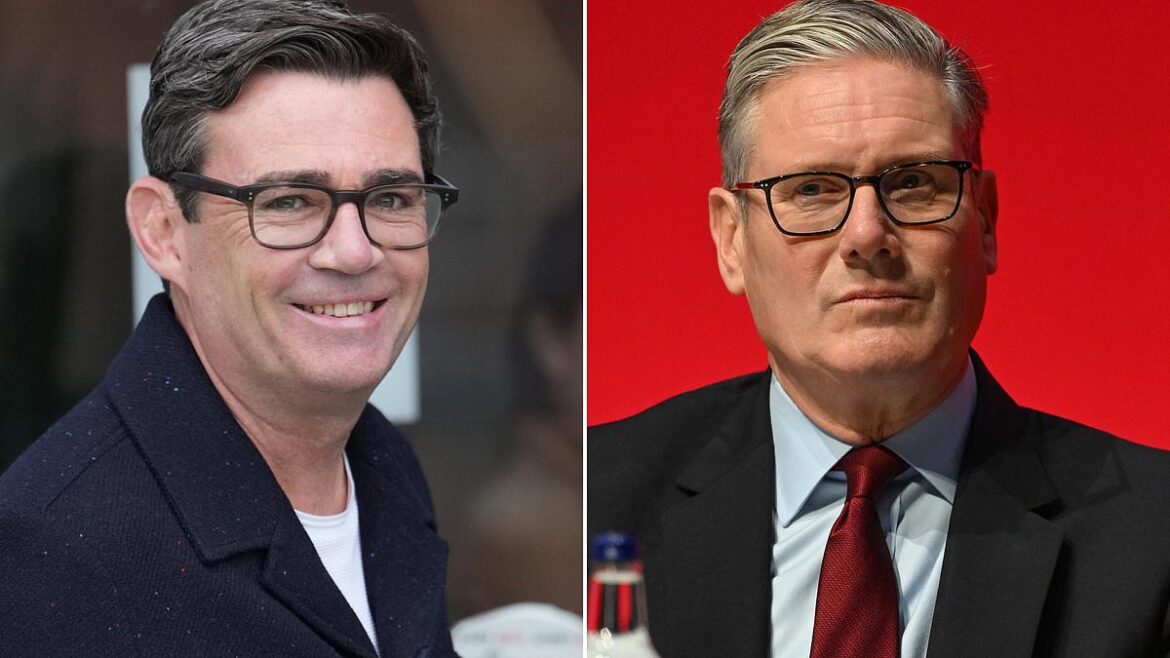The Labour Party’s conference in Liverpool has been overshadowed by drama, speculation, and open questions about leadership.
While Sir Keir Starmer was hoping for a smooth gathering, all eyes turned to Greater Manchester mayor Andy Burnham, who appeared to flirt with a leadership challenge before abruptly pulling back.
Burnham’s Retreat from the Spotlight
After days of fueling whispers that unhappy MPs were quietly urging him to step forward against Sir Keir, Burnham changed tone.
Despite fiery remarks at a fringe event on Sunday night criticizing Labour’s direction, he declared on Monday that he does, in fact, believe Sir Keir Starmer is the right person to be Prime Minister.
Pressed directly at another conference fringe session, Burnham gave a simple “Yes” when asked if Starmer should lead the party and country.
It marked a sharp shift from the image of a man ready to pounce on the Labour leadership.
Fighting Off Claims of Disloyalty
Burnham tried to explain that he has no plans to abandon the North West for Westminster, insisting, “you would have to wrench me out of the North West.”
He argued there was no real route for him to launch a bid, dismissing accusations that he was being selfish or disloyal.
Still, he stood by his headline-grabbing proposals on taxation and housing, which some critics claimed didn’t add up.
Burnham rejected the idea outright, saying he manages Greater Manchester’s finances responsibly every single day.
Ministers Push Back on His Economic Ideas
His proposals, including spending £40 billion earmarked for housing exclusively on council homes and reforming land and council tax, attracted heavy fire.
Chancellor Rachel Reeves suggested that Burnham risked straying into Liz Truss territory — borrowing and spending in ways that could destabilize the economy.
Burnham hit back, saying his policies had been misreported and misunderstood.
He argued that his goal wasn’t to undermine Labour leadership but to spark a debate about the party’s economic vision.
Defending His Record
Frustrated by the criticism, Burnham pointed to the work he’s done behind the scenes, especially on issues like the Hillsborough legislation.
He bristled at the suggestion that newcomers could brand him disloyal, insisting he’d done everything possible to make the Liverpool conference a success.
The Shadow Over Starmer
While Burnham worked to calm speculation, Professor John Curtice, Britain’s leading elections expert, delivered a grim assessment.
He suggested Labour is stuck at record-low poll ratings, with Reform UK surging ahead, and warned there’s little chance of turning things around under Sir Keir’s leadership.
Curtice argued that Starmer has failed to define what he truly stands for.
Voters, he said, don’t just want a “friendly plumber” fixing leaks in policy — they want a bold architect with vision.
And right now, Labour’s leader isn’t giving them that.
Poll Numbers Tell a Different Story
Adding fuel to the fire, Curtice unveiled polling data showing Andy Burnham as the most popular Labour figure among 2024 voters.
While Starmer’s net favourability sat at +13 percent, Burnham enjoyed a commanding +37 percent, with nearly half of Labour supporters holding a positive view of him.
The numbers suggest that, even if Burnham insists he isn’t running, the idea of him leading Labour lingers strongly in the minds of party members and voters alike.
What Comes Next?
The big question now is whether Starmer can recover his standing or if Burnham’s popularity will keep sparking whispers about the party’s future leadership.
With local elections looming next May and polls still painting a bleak picture, Labour faces a defining moment.
For now, Burnham may be retreating from the spotlight — but the shadows of doubt over Labour’s leadership haven’t gone anywhere.
